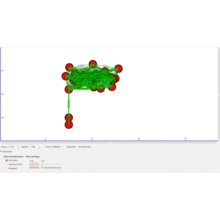Category Archive: 'M.Tech NS3 Projects'
This paper proposes a social network Sina Weibo integrated sensor platform for precision agriculture to effectively provide various agricultural agricultural services. As a case study, a greenhouse environment monitoring system employing our proposal method has been developed. Experiment results show that this system can reduce the burden of the implementation and management of wireless sensor network(WSN), and […]
We consider a multihypothesis social learning problem in which an agent has access to a set of private observations and chooses an opinion from a set of experts to incorporate into its final decision. To model individual biases, we allow the agent and experts to have general loss functions and possibly different decision spaces. We characterize the […]
In this study, we investigate the task offloading issue in mobile social networks. Although the ‘d-choice’ paradigm in ‘ball and bin’ theory [1] had shown the power of random choice in load balancing with random walk model, its performance could be fairly poor when real trace data sets are concerned. According to our preliminary evaluation results with […]
Smart cities are becoming more and more popular primarily due to increasing TIC innovations and administrative efforts from city councils to better connect citizens through stateof- the-art technology. Currently a smart city is no longer focused just on offering administrative services, but on providing useful and pervasive information to citizens and serving as basic data […]
Research on a Crowdsourcing Assignment Model based on Mobile Crowd Sensing in the Internet of Things
With the powerful sensing capability of mobile smart devices, users can easily obtained the crowd sensing services with smart devices in the Internet of Things. However, credible interaction issues between mobile users are still the hard problems in the past. In this paper, we focus on how to assign the crowdsourcing sensing tasks based on […]
The main idea behind social participatory sensing is to leverage social friends as crowd workers to participate in mobile sensing tasks. A main challenge, however, is the recruitment of sufficient number of well-suited participants. Contributing sensing data requires time and monetary cost and may potentially impose privacy risks. This may lead to the unwillingness of the participants to contribute […]
Opportunistic Internet of Things (IoT) extends the concept of opportunistic networking combining human users carrying mobile devices and smart things. It explores the relationships between humans and the opportunistic connection of smart objects. This paper presents a software infrastructure, named Opportunistic IoT Platform (OIoT), which helps developers to create and manage opportunistic IoT communities between smart devices. […]
In this paper we propose resource optimization for subscription based media content crowdsourcing. In this form of crowdsourcing, interested entities (we refer to them as Campaigners) announce their `interests’ expressing what media content (such as pictures, audio, and videos) they want to receive from participant users whereas mobile users subscribe to those interests as an […]
Vital signs obtained from people playing various types of sports can be exploited not only for diagnosing their physical conditions but also for learning the best practice to be followed to enhance their sporting abilities and skills. In this paper, focusing on a framework to collect vital data from a human group consisting of a […]
Data Mining is the extraction of hidden predictive information from large databases. The process of discovering interesting, useful, nontrivial patterns from large spatial datasets is called spatial data mining. When time gets associated it becomes spatio temporal data mining. The study of spatio temporal data mining is of great concern for the study of mobile […]

 Click Here to watch our latest output video using NS3 simulator
Click Here to watch our latest output video using NS3 simulator  Click Here to watch our latest projects screenshots using NS3 simulator
Click Here to watch our latest projects screenshots using NS3 simulator